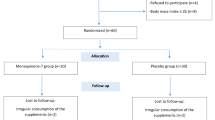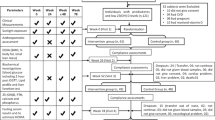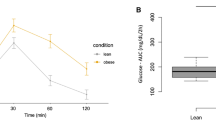Abstract
Objective:
Studies have suggested a link between lycopene and insulin-like growth factor-1 (IGF-1). The aim of this study was to test the effect of lycopene supplementation on IGF-1 and binding protein-3 (IGFBP-3) status in healthy male volunteers.
Design, setting, subjects and intervention:
This was a 4 week randomized, double-blind, placebo-controlled study of lycopene supplementation (15 mg/day) in healthy male volunteers (n=20). Fasting blood samples were collected at baseline and after 4 weeks. Samples were analysed for lycopene by high-performance liquid chromatography (HPLC) and IGF-1 and IGFBP-3 by enzyme-linked immunosorbent assay (ELISA). Changes in end points from baseline were compared in those who received placebo versus those who received the lycopene supplement.
Results:
Median change in lycopene from baseline (post-supplement – baseline) was higher in subjects in the intervention than those on placebo (lycopene group 0.29 (0.09, 0.46); placebo group 0.03 (−0.11, 0.08) μmol/l; median (25th, 75th percentiles), P<0.01). There was no difference in median change in IGF-1 concentrations (lycopene group –0.6 (−2.6, 1.9); placebo group –1.15 (−2.88, 0.95) nmol/l, P=0.52), or median change in IGFBP-3 concentrations (lycopene group 245 (−109, 484); placebo group 101 (−34, 234) nmol/l, P=0.55) between intervention and control groups. Change in lycopene concentration was associated with the change in IGFBP-3 in the intervention group (r=0.78; P=0.008; n=10).
Conclusions:
Lycopene supplementation in healthy male subjects has no effect on IGF-1 or IGFBP-3 concentrations in a healthy male population. However, the association between change in lycopene concentration and change in IGFBP-3 in the intervention group suggests a potential effect of lycopene supplementation on IGFBP-3.
Sponsorship:
University-funded.
This is a preview of subscription content, access via your institution
Access options
Subscribe to this journal
Receive 12 print issues and online access
$259.00 per year
only $21.58 per issue
Buy this article
- Purchase on Springer Link
- Instant access to full article PDF
Prices may be subject to local taxes which are calculated during checkout

Similar content being viewed by others
References
Craft NE, Wise SA, Soares JH (1992). Optimisation of an isocratic high performance liquid chromatography separation of carotenoids. J Chromatogr 589, 171–176.
Giovannucci E, Pollak M, Liu Y, Platz EA, Majeed N, Rimm EB et al. (2003). Nutritional predictors of insulin-like growth factor I and their relationships to cancer in men. Cancer Epidemiol Biomarkers Prev 12, 84–89.
Graydon R, Woodside JV, Young IS (2003). Lycopene supplementation has no effect on IGF-1 status in healthy male subjects. Proc Nutr Soc 62, 18A.
Gunnell D, Oliver SE, Peters TJ, Donovan JL, Persad R, Maynard M et al. (2003). Are diet-prostate cancer associations mediated by the IGF axis? A cross sectional analysis of diet, IGF-1 and IGFBP-3 in healthy middle-aged men. Br J Cancer 88, 1682–1686.
Hankinson SE, Willett WC, Colditz GA, Hunter DJ, Michaud DS, Deroo B et al. (1998). Circulating concentrations of insulin-like growth factor-1 and risk of breast cancer. Lancet 351, 1393–1396.
Hoppe PP, Kramer K, van den Berg H, Steenge G, van Vliet T (2003). Synthetic and tomato-based lycopene have identical bioavailability in humans. Eur J Nutr 42, 272–278.
Karas M, Amir H, Fishman D, Danilenko M, Segal S, Nahum A et al. (2000). Lycopene interferes with cell cycle progression and IGF-1 signalling in mammary cancer cells. Nutr Cancer 36, 101–111.
Kucuk O, Sarkar FH, Sakr W (2001). Phase II randomised clinical trial of lycopene supplementation before radical prostatectomy. Cancer Epidemiol Biomarkers Prev 10, 861–868.
Levy J, Bosin E, Feldman B, Giat Y, Miinster A, Danilenko M et al. (1995). Lycopene is a more potent inhibitor of human cancer cell proliferation than either α-carotene or β-carotene. Nutr Cancer 24, 257–266.
Liu C, Lian F, Smith DE, Russell RM, Wang XD (2003). Lycopene supplementation inhibits lung squamous metaplasia and induces apoptosis via up-regulating insulin-like growth factor binding protein 3 in cigarette smoke-exposed ferrets. Cancer Res 63, 3138–3144.
Mucci LA, Tamimi R, Lagiou P, Trichopoulou A, Benetou V, Spanos E et al. (2001). Are dietary influences on the risk of prostate cancer mediated through the IGF system? Br J Urol Int 87, 814–820.
Nahum A, Zeller L, Danilenko M, Prall OW, Watts CK, Sutherland RL et al. (2006). Lycopene inhibition of IGF-induced cancer cell growth depends on the level of cyclin D1. Eur J Nutr 45, 275–282.
Rao AV, Agarwal S (1999). Role of lycopene as antioxidant carotenoid in the prevention of chronic diseases: a review. Nutr Res 19, 305–323.
Renehan AG, Zwahlen M, Minder C, O'Dwyer ST, Shalet SM, Egger M (2004). Insulin-like growth factor (IGF)-1, IGF binding protein-3, and cancer risk: systematic review and meta-regression analysis. Lancet 363, 1346–1353.
Riso P, Brusamolino A, Martinetti A, Porrini M (2006). Effect of a tomato drink intervention on insulin-like growth factor (IGF)-1 serum levels in healthy subjects. Nutr Cancer 55, 157–162.
Stattin P, Bylund A, Rinaldi S, Biessy C, Dechaud H, Stenman UH et al. (2000). Plasma insulin-like growth factor-I, insulin-like growth factor-binding proteins, and prostate cancer risk: a prospective study. J Natl Cancer Inst 92, 1910–1917.
Voskuil DW, Vrieling A, van't Veer LJ, Kampman E, Rookus MA (2005). The insulin-like growth factor system in cancer prevention: potential of dietary intervention strategies. Cancer Epidemiol Biomarkers Prev 14, 195–203.
Vrieling A, Voskuil DW, Bueno de Mesquita HB, Kaaks R, van Noord PA, Keinan-Boker L et al. (2004). Dietary determinants of circulating insulin-like growth factor (IGF)-1 and IGF binding proteins 1, -2 and -3 in women in the Netherlands. Cancer Causes Control 15, 787–796.
Woodside JV, McCall D, McGartland C, Young IS (2005). Micronutrients: dietary intake versus supplement use. Proc Nutr Soc 64, 543–553.
Acknowledgements
The lycopene and placebo capsules were kindly supplied by BASF Aktiengesellschaft, Ludwigshafen, Germany. We thank to Mr Alistair Magill for assistance with the IGF-1 assay.
Author information
Authors and Affiliations
Corresponding author
Additional information
Guarantor: JV Woodside.
Contributors: RG completed the subject recruitment, laboratory analysis and drafted the manuscript, SECMG contributed to the laboratory analysis, developed the laboratory method for lycopene, and contributed to the current manuscript. ISY devised the original study design and contributed to current manuscript. UOJ and OH contributed to the study design and the current manuscript. JVW devised the original study design, carried out the statistical analyses, and contributed to the current manuscript.
Rights and permissions
About this article
Cite this article
Graydon, R., Gilchrist, S., Young, I. et al. Effect of lycopene supplementation on insulin-like growth factor-1 and insulin-like growth factor binding protein-3: a double-blind, placebo-controlled trial. Eur J Clin Nutr 61, 1196–1200 (2007). https://doi.org/10.1038/sj.ejcn.1602632
Received:
Revised:
Accepted:
Published:
Issue Date:
DOI: https://doi.org/10.1038/sj.ejcn.1602632
Keywords
This article is cited by
-
Nutritional supplements, COX-2 and IGF-1 expression in men on active surveillance for prostate cancer
Cancer Causes & Control (2011)



